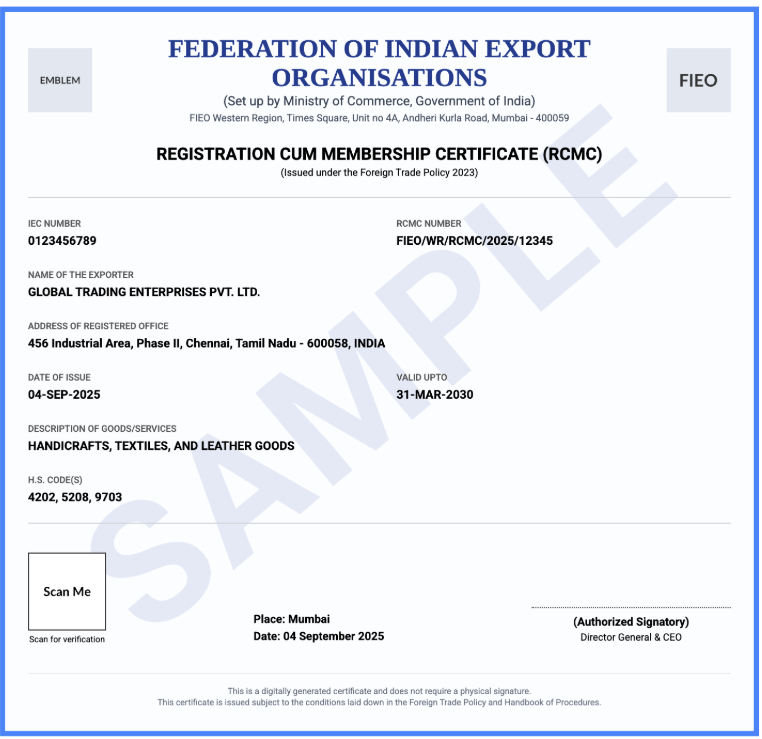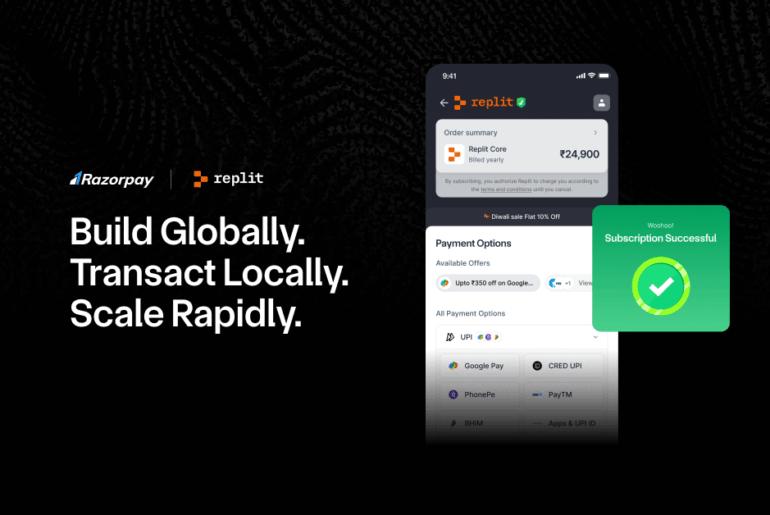Planning to expand your business to international markets? You’ve manufactured a great product, found overseas buyers, and are ready to ship your first consignment. But as you navigate the world of global trade, you’ll encounter a crucial document that acts as your passport to a world of export benefits: the RCMC.
If you’re wondering how to get government recognition, access exclusive export schemes, and add a layer of credibility to your business, this certificate is your answer. It’s a key step for any Indian exporter looking to leverage benefits under the country’s foreign trade policies. This guide will walk you through everything you need to know about the Registration-Cum-Membership Certificate (RCMC), from who issues it to how you can get one online.
Key Takeaways
|
What is an RCMC Certificate?
RCMC stands for Registration-Cum-Membership Certificate. Think of it as an official membership card for the Indian export community. It is a document that certifies you as a registered exporter dealing with specific products, and it’s issued by bodies authorized by the government, such as Export Promotion Councils (EPCs), Commodity Boards, or Development Authorities.
Holding this certificate is a prerequisite for claiming benefits under various government schemes like the Merchandise Exports from India Scheme (MEIS), Remission of Duties and Taxes on Exported Products (RoDTEP), and the Export Promotion Capital Goods (EPCG) scheme.
Why is RCMC Registration Important?
While you can export goods without an RCMC, getting one unlocks a range of advantages that can give your business a competitive edge.
- Access to Incentives: It is mandatory for exporters who wish to avail incentives and concessions from the DGFT, Ministry of External Affairs, or Customs authorities.
- Government Recognition: An RCMC enhances your credibility and officially recognizes you as a registered exporter within your industry.
- Global Exposure: The certificate is often required to participate in international trade fairs, exhibitions, and buyer-seller meets organized by EPCs, giving you a platform to showcase your products to a global audience.
- Trade Support: Your affiliated council provides members with valuable market intelligence, training seminars, and policy advocacy to support your export journey.
| 💡 Did You Know?
India has a robust network of around 26 Export Promotion Councils (EPCs), each specializing in specific product sectors like apparel, engineering goods, pharmaceuticals, spices, and more. These councils provide vital support such as market development, trade facilitation, and exporter assistance. Additionally, India has 5 major statutory Commodity Boards focused on key products including tea, coffee, rubber, spices, and tobacco. Together, these bodies comprehensively support nearly all types of exporters across the country. |
RCMC Certificate Example Template
Eligibility for RCMC Registration Online
The eligibility criteria are straightforward and designed to include a wide range of businesses.
Exporter or Merchandiser (Merchant)
Any individual or company holding a valid Importer Exporter Code (IEC) from the Director General of Foreign Trade (DGFT) can apply. This includes:
- Manufacturer exporters
- Merchant exporters (traders)
- Service exporters (e.g., IT, tourism, education)
Business Main Line Declaration
During the application process, you must declare your primary line of business. This is crucial because your RCMC will be issued by the EPC or board that oversees your specific product category. For instance, an apparel exporter would register with the Apparel Export Promotion Council (AEPC), while a food products exporter would go to the Agricultural and Processed Food Products Export Development Authority (APEDA).
Consent from the Board of the FIEO
What if your product doesn’t fit neatly into any specific council’s category? In such cases, or if you are a multi-product exporter, you can obtain your RCMC from the Federation of Indian Export Organisations (FIEO). The FIEO acts as a general council for exporters not covered by a specific body.
Benefits of a Registration-Cum-Membership Certificate (RCMC)
Securing an RCMC is more than a compliance step; it’s a strategic business move.
- Access to Export Promotion Schemes: It is your key to unlocking financial benefits like RoDTEP, Duty Drawback, and other schemes under the Foreign Trade Policy.
- Simplified Filings: Having an RCMC can streamline processes with the DGFT and customs, as it validates your authenticity as an exporter.
- Council Assistance: Your EPC provides vital support, including organizing exhibitions, buyer-seller meets, and training programs to enhance your export capabilities.
- Global Trade Facilitation: The certificate helps in brand building and adds a layer of trust, making it easier to facilitate trade with international partners. For MSMEs and new exporters, it’s an essential tool for scaling globally.
RCMC Registering Authorities
The RCMC is issued by different bodies depending on your product.
Export Promotion Councils (EPCs)
These are product-specific councils, such as the Engineering Export Promotion Council (EEPC), Pharmaceuticals Export Promotion Council (Pharmexcil), and Council for Leather Exports (CLE).
Commodity Boards
These boards handle specific agricultural commodities like the Spice Board, Coffee Board, and Rubber Board.
Development Authorities
These include bodies like APEDA (for agricultural and processed foods) and MPEDA (for marine products).
| Issuing Body | Covered Products/Industries |
| APEDA | Fruits, vegetables, and other processed food items |
| FIEO | Multi-product or general merchandise exports |
| GJEPC | Gems & Jewellery |
| AEPC | Apparel and textiles |
| EPCH | Handicrafts |
Validity of RCMC
An RCMC certificate is generally valid for 5 years from April 1st of the issuing year and concludes on March 31st of the final year. Some councils may require an annual renewal of the membership fee to keep the certificate active. It is the exporter’s responsibility to ensure any changes—such as a change of address, directors, or product line—are updated with the issuing authority.
Documents Required for RCMC
The documentation process is now mostly digital. Here’s what you’ll typically need:
| Document | Description |
| PAN Card & Aadhaar | Identity and business proof for the applicant or firm. |
| Importer Exporter Code (IEC) | A self-attested copy of the IEC Certificate issued by the DGFT. |
| Business Registration Proof | Certificate of Incorporation for companies, Partnership Deed for firms, or proof of proprietorship. |
| Bank Certificate / Cancelled Cheque | A certificate from your bank verifying your account details. |
| MSME/Udyam Registration (optional) | Beneficial for small and medium enterprises. |
| Board Resolution (if applicable) | A resolution passed by the company’s board authorizing a signatory. |
Types of Exporters/Importers Covered under RCMC
The RCMC framework is inclusive and covers various business models involved in international trade:
- Manufacturer Exporters
- Merchant Exporters
- Service Exporters (IT, education, tourism, etc.)
- Deemed Exporters (those who supply goods that are ultimately exported)
- Export-Oriented Units (EOUs) and Special Economic Zone (SEZ) exporters
Compliance with RCMC
To maintain the validity and benefits of your RCMC, you must:
- Renew on Time: Ensure your registration is renewed before its expiry to avoid any disruption in benefits.
- Maintain Records: Keep proper documentation of your export transactions and stay updated with your EPC’s requirements.
- Ensure Accuracy: The product categories you have declared must be accurate. Misrepresentation can lead to the revocation of your certificate.
RCMC Registration Procedure: DGFT Common Digital Platform
Thanks to the DGFT’s common digital platform, the RCMC registration online process has become seamless. Here’s a step-by-step guide:
- Visit the DGFT Portal: Go to the official DGFT website (https://www.dgft.gov.in).
- Log In: Use your IEC credentials to log in to the portal.
- Navigate to Services: Find “RCMC Registration” under the services tab.
- Select Authority: Choose the appropriate Export Promotion Council or Commodity Board from the dropdown list based on your main line of business.
- Fill the Application Form: Enter all required details, including your IEC, PAN, business profile, and product information.
- Upload Documents: Upload scanned copies of all the required documents as listed above.
- Pay the Fee: Pay the registration fee online through the integrated payment gateway. The fee varies between councils.
- Submit and Verify: After submission, the respective authority will verify your application and documents.
- Download Certificate: Once approved, you can complete your RCMC certificate download directly from the DGFT dashboard.
Accept International Payments Seamlessly with Razorpay
Once your RCMC is ready and you’re set to export, the next big step is getting paid. Managing international transactions in a secure and compliant manner is critical. This is where Razorpay International can help.
Why Razorpay for Exporters?
- Accept payments from over 100 countries in their local currencies.
- Integrate easily with your Shopify, WooCommerce, or custom-built online store.
- Get real-time currency conversion and quick settlement in Indian Rupees.
- Automate your export documentation, like the Foreign Inward Remittance Advice (FIRA), directly from your dashboard.
- Operate with peace of mind, thanks to RBI and AD-bank compliant payment flows built for Indian exporters.
Simplify International Payments with Razorpay
Power your global business the right way.
Conclusion
For any business aiming to succeed in the global marketplace, the RCMC is not just a document but a foundational tool. It legitimizes your status as an exporter, unlocks powerful government incentives, and connects you with a support system dedicated to promoting Indian exports.
With the online registration process on the DGFT platform, getting your RCMC has never been easier. By identifying the right council and completing the application early, you ensure your business is compliant and fully prepared to compete on the world stage. Staying compliant means staying export-ready.
FAQs
Q1. Is RCMC mandatory for all exporters?
No, it is not mandatory for all exports. However, it is required if you want to avail of benefits, concessions, or incentives under the Foreign Trade Policy or other government schemes.
Q2. What is the fee for RCMC registration?
The registration fee varies depending on the specific Export Promotion Council or Commodity Board you are applying to. It is typically paid online during the application process.
Q3. Can I register online through DGFT?
Yes, the entire process for applying for a new RCMC, renewing an existing one, or amending it can be done online through the DGFT’s common digital platform.
Q4. What happens if I change my product category?
If you change your main line of business or add a new product category, you must inform your issuing authority to have your RCMC amended accordingly.
Q5. Which EPC should I choose if my product isn’t listed?
If your product is not covered by any specific EPC or Commodity Board, or if you are a multi-product exporter, you should apply for an RCMC from the Federation of Indian Export Organisations (FIEO).




